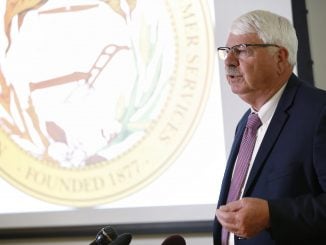
RALEIGH — A new state audit says $7.8 million in first unemployment benefits did not go out in a timely manner between Jan. 1, 2023, through Dec. 31, 2023.
The report by the North Carolina Office of the State Auditor (OSA) says the Division of Employment Security (DES) “remains at risk” of not being able to provide timely payments, especially in an instance of an economic downturn.
Additionally, DES consistently did not meet federal timeliness standards. From the data graphs in the report, DES failed to reach federal timeliness standards (87% within 21 days) for the three years spanning 2020-23.
DES is part of the state Department of Commerce, headed by Secretary Machelle Sanders and Deputy Secretary M. Antwon Keith.
“DES did not fully implement OSA’s recommendation to review the design of its unemployment benefit claims process and ensure the process is designed so that first payments meet the federal timeliness standard,” the OSA report says.
The report says the full implementation did not occur “because it chose to prioritize improvements to claimant eligibility determination processes” over timeliness.
“Specifically, DES implemented faster ‘second request’ employer notices for separation questionnaires, and implemented changes to the work distribution system to rank claimant eligibility work items by priorities,” according to the report.
Per the report, in 2023, the Department of Employment Services (DES) issued 60,815 first unemployment benefit payments: 57% (34,718) met the federal timeliness standard; 43% (26,097) were late and 19% (11,371) took more than 35 days.
The audit also says DES’s first payment timeliness has “worsened” since the last audit performed on the topic and decreased from 76% during the previous audit to 57% in the current audit.
“First payment timeliness decreased despite North Carolina’s unemployment rate decreasing from 13.5% in April 2020 to 3.5% in December 2023,” the report states. “Additionally, DES no longer administers the additional six unemployment programs implemented in response to the COVID-19 pandemic.”
Former State Auditor Beth Wood’s prior audit of DES was published in early 2022 and found the agency failed to get the first pandemic benefit payments out in a timely manner in 2020 between Jan. 1 and March 31. The dollar figure attached to those payments was $438 million.
Another audit released in the latter half of 2022 revealed $166 million in improper unemployment insurance (UI) payments made between the beginning of April 2016 and the end of March 2021. The improper unemployment insurance payment rate averaged 18% from April 1, 2016, through March 31, 2021, and exceeded the 10% federal improper payment rate allowed by the United States Department of Labor.
The 2022 audit report said DES exceeded the improper payment limit because it failed to implement USDOL recommendations to reduce improper payments that resulted from three areas: work search requirements, benefit year earnings, and separation information issues.
These three types of errors made up 94% of all DES overpayments over the last five years.
In November 2023, lawmakers held a hearing on DES’s history of late payment issues and the impact of the COVID-19 pandemic.
Wood testified there was a history of the state’s unemployment program having late payment issues going back at least nine years before the pandemic. She reported that from April 4, 2020, to Sept. 4, 2021, only $2.2 million out of $3.6 million (60%) met the federal requirement.
During that timeframe, approximately $1.2 billion was disbursed, with $438 million, or 36% of the total payments, being delayed.



